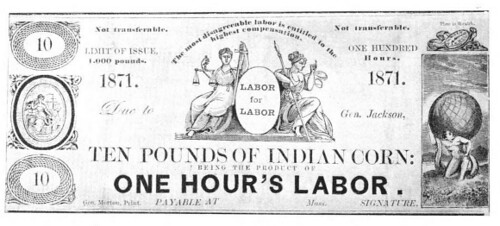
PREV ARTICLE
NEXT ARTICLE
FULL ISSUE
PREV FULL ISSUE
MODERN-DAY TIME BANKSI'm fascinated by the labor exchange movement and its time-based paper money as promoted by Robert Owen in England in the 1830s and G. B. De Bernardi in the U.S. in the 1890s. We also discussed an unusual time-denominated token recently. Time banks are an idea whose time comes again and again as new generations rediscover the concept. I had no idea time banks were operating today, yet this April 26, 2019 Washington Post article describes several including one operating in Silver Spring, MD. Here's an excerpt - be sure to read the complete article online. -Editor

On a recent spring morning, Susan Alexander left her Maryland home, climbed into her Volkswagen Passat and drove about three miles to pick up two strangers. She battled rush-hour traffic on the Capital Beltway and George Washington Memorial Parkway before dropping them off curbside at Reagan National Airport. She didn’t earn a dime for her trouble, and that was the point. There and back, the trip took about 90 minutes — worth about $40 if Alexander, a retired government intelligence analyst, were an Uber driver. Instead, she’s a member of the Silver Spring Time Bank — one of more than 100 such exchanges around the world trying to build community by exchanging time credits for services instead of dollars and cents. “I have time,” she said. “I like giving the gift of time to other people.” Though some communities have experimented with local currencies, today’s time banks offer an alternative to the U.S. dollar powered by 21st-century technology. About 70 exist across the country — some with a few members, others with hundreds — to give value to work that members say often goes uncompensated in a traditional market economy. Without money changing hands or shifting between virtual accounts, the airport drop-off was more like a coffee klatch than a taxi ride. Driver and passengers chatted about projects they’ve completed for the time bank, and no one raised an eyebrow when Mary said she likes “to avoid the conventional economy.” “The beauty of this is that you make friends,” Mary Liepold said. “You don’t just get services.” The Silver Spring Time Bank formed in 2015 and has about 300 members, said co-founder Mary Murphy. Last year, she said, 1,000 hours were exchanged for basic home repairs, dog walking, cooking and tailoring, among other services, without the exchange of money. Edgar S. Cahn, an 84-year-old law professor at the University of the District of Columbia who had worked on civil rights and anti-poverty legislation in president Lyndon B. Johnson’s Justice Department, suffered a heart attack in 1980. He said doctors gave him two years to live, with “maybe two good hours a day.” “I thought: What do I do with two good hours a day?” he said, having beaten doctors’ expectations by nearly four decades. “I have to teach people to value themselves.” Cahn became a proselytizer for what he called the “time dollar” — a currency in which an hour of work is worth an hour of work, whether it’s performed by a maid, a mechanic or a mechanical engineer. In 1995, he founded the D.C. nonprofit TimeBanks USA, which developed the software used by many time banks around the world. (The organization charges time banks a one-time $79 start-up fee in actual dollars for the software, and additional fees of about $3 per member each year.) While the world is unlikely to shift to an international time credit economy, hours have been exchanged in time banks in at least seven countries, including South Korea, New Zealand and France, according to the TimeBanks USA website. One of the most-active time banks in the United States is the Crooked River Alliance of Timebanks, based in Kent, Ohio. Started in 2010, the alliance has 1,200 members in five branches that have facilitated more than 70,000 hours of exchanges, according to Abby Greer, its founder and director. Unfortunately for numismatists, the modern time banks don't seem to issue physical notes, scrip or tokens - deals are arranged online. -Editor
To read the complete article, see:
To read earlier E-Sylum articles, see:

Wayne Homren, Editor The Numismatic Bibliomania Society is a non-profit organization promoting numismatic literature. See our web site at coinbooks.org. To submit items for publication in The E-Sylum, write to the Editor at this address: whomren@gmail.com To subscribe go to: https://my.binhost.com/lists/listinfo/esylum All Rights Reserved. NBS Home Page Contact the NBS webmaster 
|